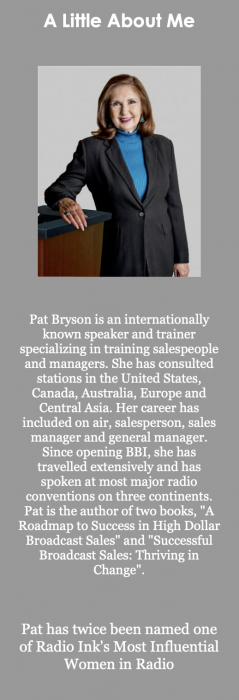Selling Radio Direct with Pat Bryson
Us: “What’s your budget?”
Client: “I don’t really have one.”
Or
Us: “What’s your budget?”
Client: “I have $200 a month.”
I bet you’ve had conversations with prospects that sounded like these. Clients often don’t want to tell us their budgets because they think we will take every last dollar they mention. Even more common than this are clients that don’t have a clue as to what they SHOULD invest in radio. They know what they HAVE spent in the past (do you run into clients who spent a whopping $99 a month?) and they have no idea that what they purchased was a waste of money. Worse yet, WE sold it to them. It’s hard to go back and change expectations without calling their baby ugly.
IT’S NOT ABOUT THE BUDGET; IT’S ABOUT THE SCHEDULE.
There are basically two types of advertising schedules: events and sales or branding (bonding) campaigns. The formula for creating schedules for these two types of objectives are constant across market size, format, country.
 Event or sale: One commercial an hour, starting at the event and working backwards 7-14 days as the budget allows. The goal is to reach as many listeners as possible in a short period of time with a message that has a “fuse” on it. The message must answer, “Why should I change my routine and attend this sale or event? What’s in it for me?” And, the message better be compelling!
Event or sale: One commercial an hour, starting at the event and working backwards 7-14 days as the budget allows. The goal is to reach as many listeners as possible in a short period of time with a message that has a “fuse” on it. The message must answer, “Why should I change my routine and attend this sale or event? What’s in it for me?” And, the message better be compelling!
Branding or bonding: Enough commercials weekly to reach half your station’s audience a minimum of three times. You can figure the number of commercials it takes if you subscribe to ratings. But if not, a good rule of thumb is 3 commercials a day, 7 days a week, for at least 52 weeks. In today’s crowded advertising environment, I am now suggesting 4 or 5 a day. Many of my clients sell 2 and 3 year agreements instead of 1 year. There is a scientific reason for doing so. And remember, most businesspeople are used to multi-year leases on everything from their space to office equipment. Why not their advertising? How long people listen to your station (your TSL) is a determining factor to the number of commercials you need weekly.
Although the formulas are constant across markets, formats and countries, the investment is not. The amount these schedules require as an investment will be different in Chicago, Calgary, CA, Brisbane, AU, Malta, Taylorville, Il. Figure for each of your stations what the investment should be using your rate card for each type of schedule. Now you know what budget your clients need to buy effective schedules with you.
Instead of asking, “What’s your budget?”, you can use “Brackets” and 3rd party references to establish the dollars needed.
“Mr. Prospect, other clients who have similar objectives to yours have found investing between $___________ and $___________ a week to be effective. In that range, where are you comfortable?
You want to introduce a “high” and a “low” number that is slightly above what you need to fund the campaign. Then, you can adjust the numbers downward until they are comfortable.
You have introduced the amount. This conversation is held later in the needs analysis meeting. You have determined their pains, goals and objectives. You have an idea of how much they need to invest to be effective. By using the 3rd party reference, you have legitimized your numbers.
Believe it or not, we are more concerned about budgets than our clients are. We are afraid to ask for more. If the client feels we can help them to remove their pain, to help them to achieve their goals, they will find the money. Remember, they are spending it somewhere, just not always with us.
As we move into selling digital products as well as radio commercials, it becomes even more important that we become comfortable asking for larger dollars. We KNOW what it takes to craft effective campaigns for our clients. We also know what probably won’t work. When using the brackets, if your client firmly states an amount you KNOW will not be enough to fund an effective schedule, you should tell them. This is where sales managers faint or try to cover my mouth with tape. Do we walk away or take an ineffective schedule? Guess which one I recommend? We do not want to create an environment in which we hear, “My advertising didn’t work.” And by standing your ground, many times the prospect will take our recommendation. After all, why type of salesperson walks away from money? Successful ones. Ones who have the courage of their convictions. Clients appreciate that. They appreciate it even more when the advertising makes them money!
Concentrate on the needs and goals. Translate those needs and goals into effective schedules.
Sell schedules not budgets!

